Temperature Monitoring Systems for Hospital
If you’re looking for a cloud-based hospital (or freezer) temperature monitoring system that helps your team eliminate manual logging, improve compliance readiness and protect all your temperature-sensitive assets, you’ve arrived at the right place.
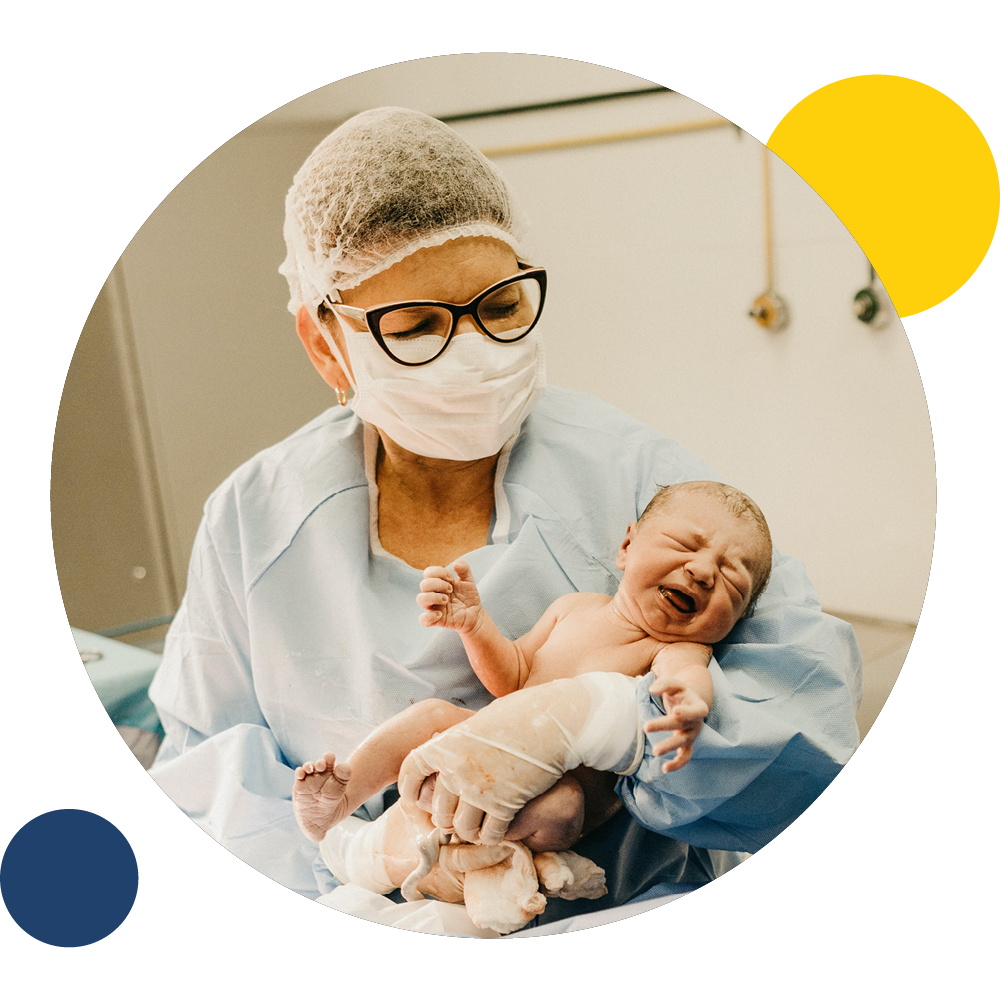
Let us help you evaluate your needs!
- Safety: Alerts via text, email, push notifications and phone calls to protect your precious assets
- Compliance: Automated compliance reports
- Efficiency: Reduced Manual Logging and time spent on reports
And what makes us different?
- Lifetime Warranty: Never buy hardware again!
- Unlimited Users: Scale across your entire organization
- Connectivity Flexibility: Wi-Fi, Cellular or Data Hub
- Phone call alarms: Alerts won't get ignored
- Mobile App: 500 Freezers in your pocket
- Facility monitoring: Simple to add water leak, door open, occupancy, and even IAQ monitoring
Engineered in Indiana with U.S.-based support.
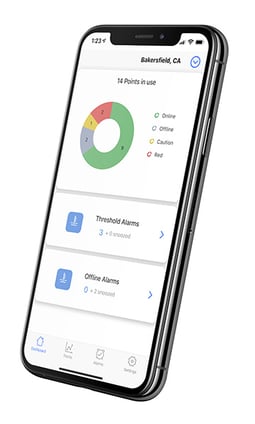
Healthcare Monitoring
From the operating room to the cafeteria freezer, risks of a broken freezer or compromised clean room can range from the loss of tens of thousands of dollars in inventory to adverse patient outcomes.
Healthcare Brochure
See What Customers Say About Sonicu
Asset Protection. Compliance Automation. And Reduced Manual Processes.
Sonicu serves thousands of professionals at hundreds of organizations across North America by improving how they monitor and manage their most sensitive assets and environments.
Professionals from healthcare, life science, laboratory and cold chain facility management turn to Sonicu to help them improve the way they do business.
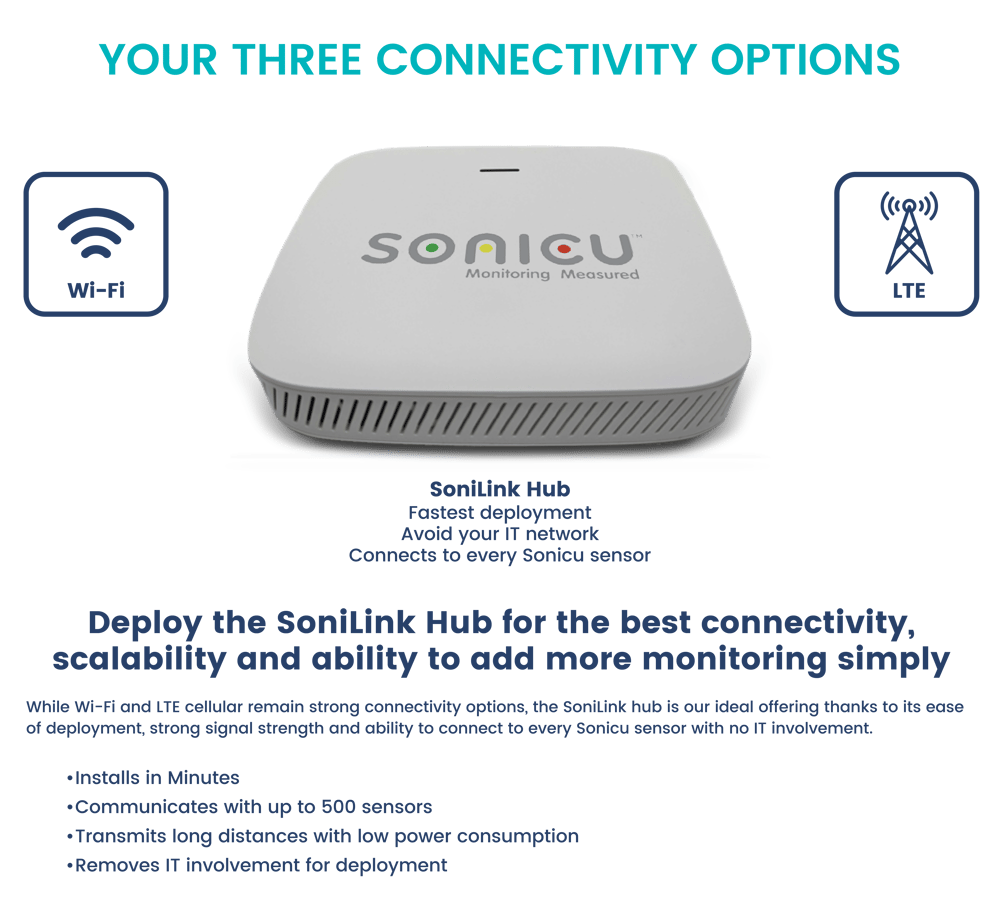
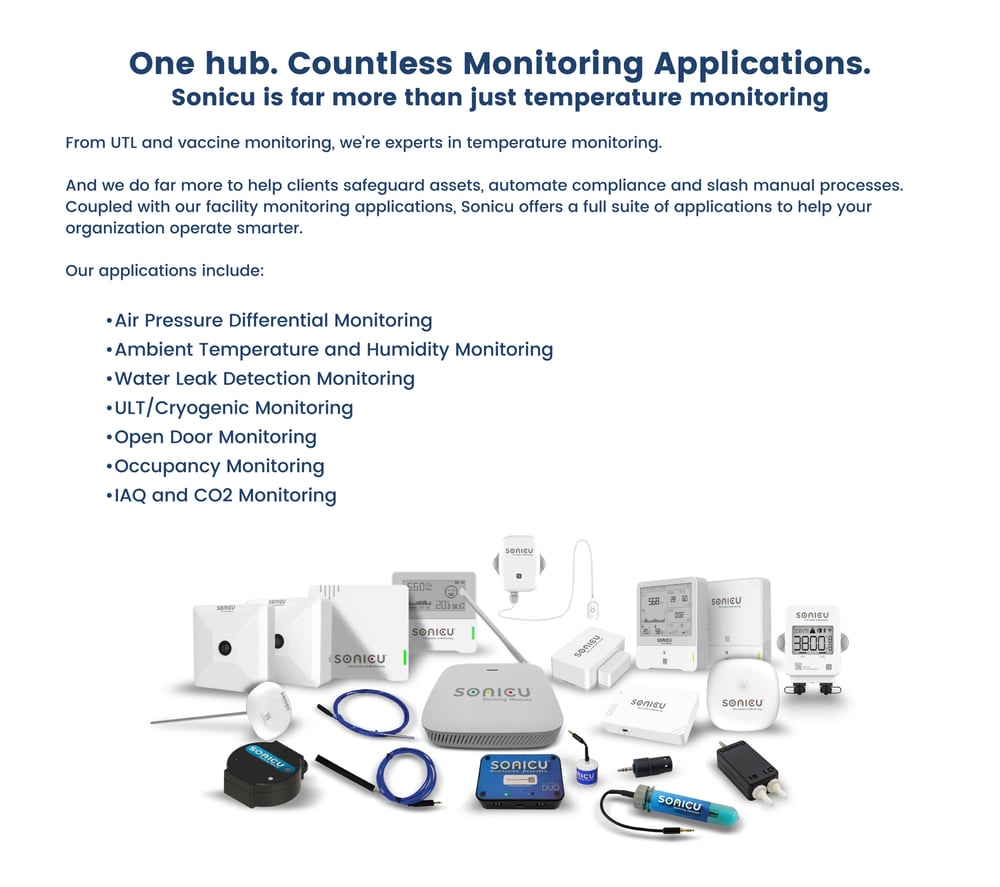

Temperature Monitoring Systems
for Hospital
Some of the finest names in healthcare, including Indiana University Health, Nomi Health and even the Boy Scouts (not to mention the University of Michigan Health System and Stanford University) rely on Sonicu to provide robust continuous temperature monitoring for their cold and frozen environments.
These respected brands turn to Sonicu for three primary reasons:
- Operational Efficiency: Virtually eliminate the need for tedious and costly manual logging
- Compliance Automation: Respond to virtually any regulatory audit or inspection in a few clicks with our reports section
- Asset Protection: Detect and respond to any temperature excursion that can threaten virtually anything perishable: food, drugs, vaccines, research, etc.
When you combine these three significant feature benefits, our clients average about $80,000 of savings for every 100 hospital beds.
At non-healthcare-related locations without beds, it’s not hard to imagine the time savings alone by simply not having staff manually record temperatures several times per day.
Our customers stay with us thanks to our American-based customer support that is never more than a phone call away.
While our technology is intuitive and powerful, we know it’s only as strong as the people who stand behind it.
You can learn more about how we support our customers in their own words HERE>
 Temide real-time data on temperature and environmental conditions levels, enabling healthcare providerperature monitoring systems are critical tools for ensuring healthcare facilities maintain optimal conditions for patients, staff, and medical equipment.
Temide real-time data on temperature and environmental conditions levels, enabling healthcare providerperature monitoring systems are critical tools for ensuring healthcare facilities maintain optimal conditions for patients, staff, and medical equipment.
These systems proves to detect potential issues before they become critical.
Temperature monitoring systems are used in various healthcare settings, including hospitals, clinics, laboratories and pharmacies. Sonicu serves more hundreds of these facilities in every state with more than 20,000 users logging on regularly to protect their assets and automate their regulatory compliance.
A temperature monitoring system is a device or system that measures and tracks temperature and humidity levels.
These systems are designed to ensure that a facility's temperature and humidity levels remain within a specific range. Temperature monitoring systems typically comprise sensors and probes, communicating devices and software that collect and analyze data.
The importance of temperature monitoring for hospitals and healthcare facilities cannot be overstated.
Temperature and humidity and air pressure differential levels are crucial in maintaining patient comfort, preventing the spread of infectious diseases and preserving the efficacy of medical equipment and medications.
Temperature monitoring systems can also help healthcare facilities comply with regulatory requirements and accreditation standards.
Sonicu strives to deliver simple and affordable temperature and environmental monitoring that delivers three value propositions:
Asset Protection. Compliance Automation. And Reduced Manual Processes.
From cold and frozen temperature storage to ambient conditions like relative humidity and air pressure differential to specific needs like CO2 and VOC monitoring, Sonicu provides a full suite of monitoring solutions.
Easy to install and configure and supported by live American-based phone support, Sonicu is the affordable, intuitive and trusted temperature and environmental monitoring solution trusted nationwide.
You can learn more about how our software helps compliance professionals in these case studies:
Discount Drug Mart: Power Outage Protection + Compliance Automation
Problem: Transitioning from manual temperature logs and reactive power outage management
Solution: Adopting Sonicu's advanced system for seamless temperature monitoring and real-time power outage alerts across its 77 locations.
Hendricks Health: From Nutrition to the OR
Problem: The need to improve compliance and safety across various departments, starting from nutrition to the operating rooms.
Solution: Upgraded monitoring systems to enhance patient safety and streamline compliance across multiple facilities, including local YMCA rehabilitation facilities.
IU Health: Enterprise Monitoring
Problem: Challenges of using a locally based server and multiple monitoring solutions across departments.
Solution: Transitioned to a single, cloud-based solution with Sonicu to enhance monitoring capabilities across more than a dozen locations and the IU School of Medicine.
What Is A Temperature Monitoring System?
A temperature monitoring system is a device or set of devices specially designed to measure and track temperature changes in a particular area or object.
A laboratory temperature and humidity monitoring system is an example.
Temperature monitoring systems have become increasingly important in various industries and sectors, including healthcare, manufacturing, food service, and transportation, among others.
How Are Temperature Monitoring Systems Used In Hospitals?
Temperature monitoring systems are critical in healthcare facilities, where temperature-sensitive items, such as medication and vaccines, tissues and organs must be stored at precise temperatures to maintain their effectiveness.
Inaccurate temperature readings can result in spoilage or contamination of these essential items, which can ultimately harm patients and compromise the quality of healthcare services.
Temperature monitoring systems typically consist of sensors that are installed in various locations, such as refrigerators, freezers, and storage rooms.
These sensors are connected to a central monitoring unit, which collects temperature readings and alerts staff members when temperatures fall outside the acceptable range.
While the majority of Sonicu customers are from the healthcare sector, we also serve many other industries with temperature or environmental monitoring needs, oincluding :
- Healthcare: Nurses respond to our alerts to keep your medicine safe
- Life Science/Lab: Lab directors rely on our alerts to protect priceless research
- Universities: Research and science department heads
- Food Service: Food distributors rely on our tech to protect your dinner
Sonicu is trusted by more than 600 organizations to provide affordable and simple temperature monitoring that protects assets and automates regulatory compliance
The monitoring unit can also log temperature readings over time, allowing healthcare professionals to analyze trends and identify potential issues before they escalate.
This data can help improve the efficiency of the healthcare facility and ensure patients receive the highest quality care possible.
Here are a few more examples of healthcare organizations that trust Sonicu for their temperature and environmental monitoring needs:
Hospitals Worldwide are Investing in Temperature Monitoring Systems
Hospitals worldwide are adopting temperature monitoring systems to ensure optimal environmental conditions for patients and healthcare staff. Among these hospitals are Indiana University Health, the University of Michigan Health System, and Stanford University.
- Indiana University Health has implemented temperature monitoring systems to ensure all critical hospital areas maintain the required temperature and humidity levels for patient comfort and safety. The temperature monitoring system has enabled the organization to maintain high-quality healthcare services and reduce labor costs
- Cleanslate Treatment Centers: The network of nationwide treatment centers based in Massachusettes adopted Sonicu temperature monitoring to improve their regulatory compliance reporting and to provide their head office with better visibility on their asset protection.
- Ohio University: The innovation incubator turned to Sonicu to provider all of its temperature and environmental monitoring to support small tech businesses leveraging its labs to grow into independent commercial enterprises.
These respected organizations an institutions, among many others, have chosen Sonicu as their reliable provider of temperature monitoring systems.
Sonicu offers innovative and state-of-the-art technology that allows healthcare facilities to monitor their environmental conditions in real-time, providing alerts and data analysis to improve patient outcomes and reduce the risk of loss due to temperature excursions.
Types of Temperature Monitoring Systems
There are several types of temperature monitoring systems, each with its own unique features and benefits.
1. Wired Systems
This type of temperature monitoring system uses wired probes and sensors to track temperature and humidity levels. These sensors are connected to a central monitoring device, which collects and analyzes the data.
Wired systems are often used in extensive healthcare facilities that require multiple sensors to monitor different areas.
The move today is away from wired systems as they require far more labor costs to install and are generally not as flexible in being moved to different locations in facility.
2. Cellular Temperature Monitors
These systems use cellular technology to transmit temperature and humidity data to a central monitoring device.
Cellular temperature monitors are particularly useful in remote or off-site locations where wired systems are impractical. Sonicu is able to leverage Wi-Fi, cellular or LoRaWAN, which is a special frequency designated especially for the Internet of Things. Few other monitiriong companies
3. Wireless Temperature Monitors
A wireless temperature monitoring system uses wireless technology to transmit data to a central monitoring device. These sensors are battery-operated and can be placed in any location, making them a versatile and cost-effective option for healthcare facilities of all sizes.
Overall, the type of temperature monitoring system a healthcare facility chooses will depend on its specific needs, budget, and regulatory requirements.
Benefits of Remote Temperature Monitoring Systems for Hospitals
In healthcare facilities, temperature monitoring is essential to maintaining a safe and healthy environment for patients and staff.
Traditional temperature monitoring systems require manual checks, which can be time-consuming, labor-intensive and prone to errors.
The advent of remote temperature monitoring systems has revolutionized the way hospitals monitor the temperature.
Monitor Multiple Locations Simultaneously
One of the significant benefits of remote temperature monitoring systems is the ability to monitor multiple locations simultaneously. With remote monitoring, hospitals can keep tabs on temperature-sensitive areas, such as operating rooms, laboratories, and pharmacies, in real time. This feature is especially useful for large hospitals with multiple buildings, where it would be challenging to monitor all areas manually.
Provide Real-Time Alerts
Remote temperature monitoring systems also provide real-time alerts when temperatures exceed predetermined thresholds. This feature is critical as it allows healthcare providers to immediately act before significant damage occurs. In some cases, even minor fluctuations in temperature can affect the quality of medicines or medical devices, leading to potential harm to patients.
Automatic Data Logging for Trend Analysis
Another advantage of remote temperature monitoring systems is the automatic data logging over time for trend analysis. This feature allows healthcare providers to analyze temperature data over a period, identify patterns, and predict potential issues. It is especially useful for hospitals that need to comply with regulatory requirements, such as those set by the Food and Drug Administration (FDA).
Compare Environmental Conditions
In addition to monitoring temperature, remote monitoring systems can also compare environmental conditions across different locations. By comparing data across multiple locations, hospitals can identify areas that require attention and prioritize maintenance or repairs. This feature can help hospitals optimize their resources, reduce energy consumption and save money in the long run.
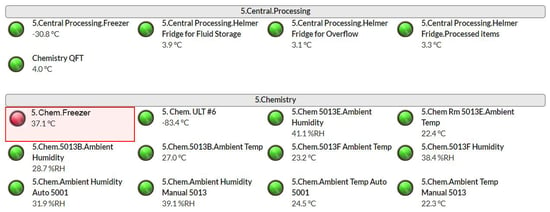
Upgrade Temperature Monitoring for Hospitals with Sonicu
Temperature monitoring is a critical aspect of ensuring optimal healthcare services in hospitals.
Accurate and reliable monitoring can help prevent the spoilage of temperature-sensitive materials, such as medication and blood products and prevent the growth of harmful bacteria in storage areas.
Remote temperature monitoring systems offer many advantages over traditional wired systems, including real-time alerts, trend analysis, and the ability to monitor multiple locations simultaneously.
When it comes to choosing a manufacturer of temperature monitoring systems, Sonicu stands out as a reliable and trusted provider.
Sonicu wireless temperature and humidity sensors use radio frequency signals and cellular networks to offer remote monitoring through cell phone apps or text messages, ensuring hospital staff can access real-time data and take immediate action if necessary.
Additionally, Sonicu's automatic data logging system allows for trend analysis and comparison of environmental conditions across different locations, making it an excellent choice for hospitals of all sizes.
For hospitals seeking to improve their temperature monitoring systems, Sonicu is the go-to manufacturer for reliable, accurate, and efficient systems that meet all their monitoring needs.
You can learn more about how our software helps compliance professionals in these case studies:
Ohio University Innovation Center
Problem: Tech and tech-enabled startups at the Innovation Center needed reliable support systems for temperature and environmental monitoring due to the requirements of grant-funded projects.
Solution: Implement Sonicu for comprehensive monitoring of temperature, ambient humidity, and air pressure differential, ensuring necessary protection and compliance.
Hancock Regional Health: Enterprise Monitoring from Sound to Environmental
Problem: Disparate monitoring systems were taxing the staff with many manual processes, leading to inefficiencies and reduced asset protection.
Solution: CEO Steve Long initiated the adoption of a consolidated monitoring program for temperature, environmental, and sound, which automated compliance and reduced manual logging.
Xytex Sperm Bank: Ultra Low Temperature Monitoring
Problem: Frequent false alerts were causing alarm fatigue, threatening the operations at Xytex Sperm Bank.
Solution: Partnered with Sonicu to develop a custom temperature monitoring solution for ULT and cryo temperatures, including probes inside and outside the preservation chambers.
American-based Customer Support: Robust & Reliable High Touch Service
Software and technology is only as good as the people who stand behind it.
At Sonicu, that means our team of American-based customer success managers who are never more than a phone call away to help field and fix any service issues.
Our probes and sensors are placed in demanding frozen environments and our software literally sends billions bits of data monthly, meaning there’s always the potential for a hiccup on either the hardware or software.
We are committed to fielding every customer service request promptly and addressing our customer’s concerns promptly and professionally.
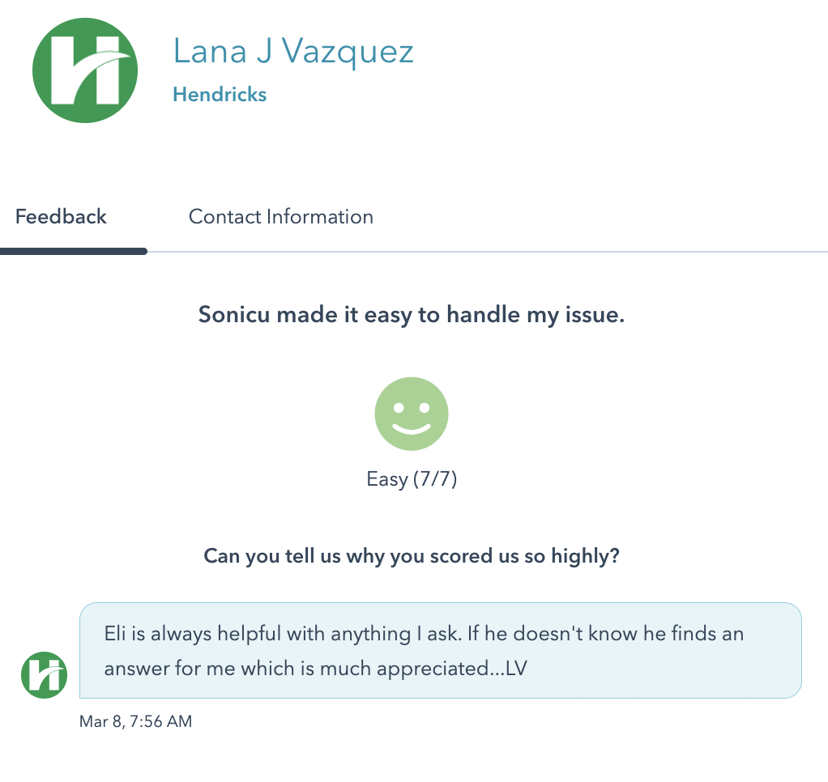
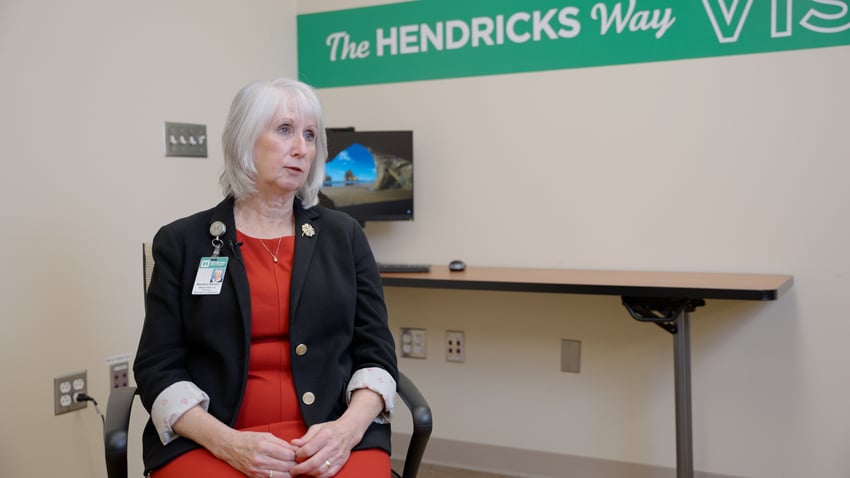 “I like to say that every refrigerator or freezer is like a car in that they all behave a bit differently,
“I like to say that every refrigerator or freezer is like a car in that they all behave a bit differently,
and then every now and then you just get a bad boy who doesn’t want to perform as we need it to,”
Martha Rardin, Director, Nutrition and Dietetics, Hendricks Regional Hospital.
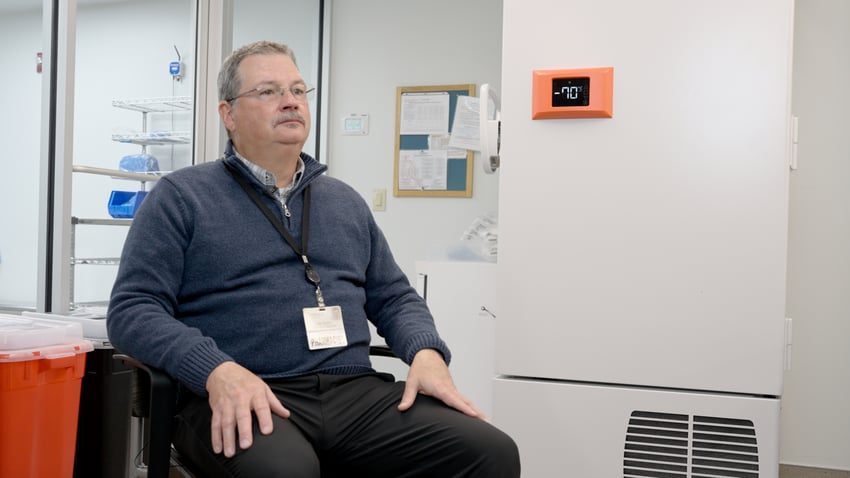 “Sonicu has been a powerful tool to identify which units are behaving out of spec and get our team
“Sonicu has been a powerful tool to identify which units are behaving out of spec and get our team
to fix them before we have a serious issue.”
Tim Livesay, Director, Hancock Regional Hospital Pharmacy Director


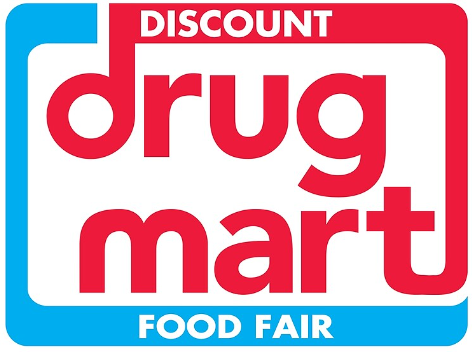
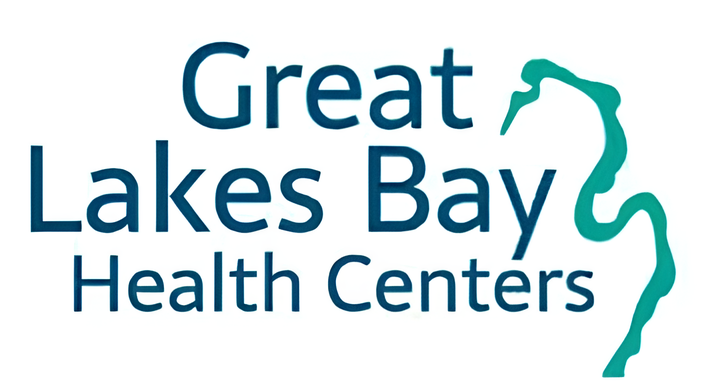

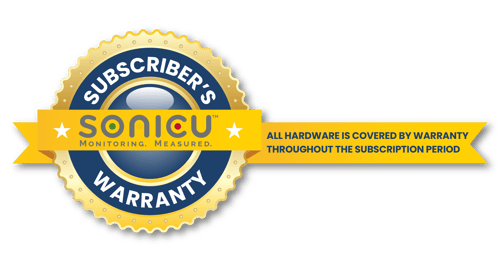


How IU Health
consolidated all of its pharmacy monitoring needs
into one cloud-based platform serving dozen of locations.